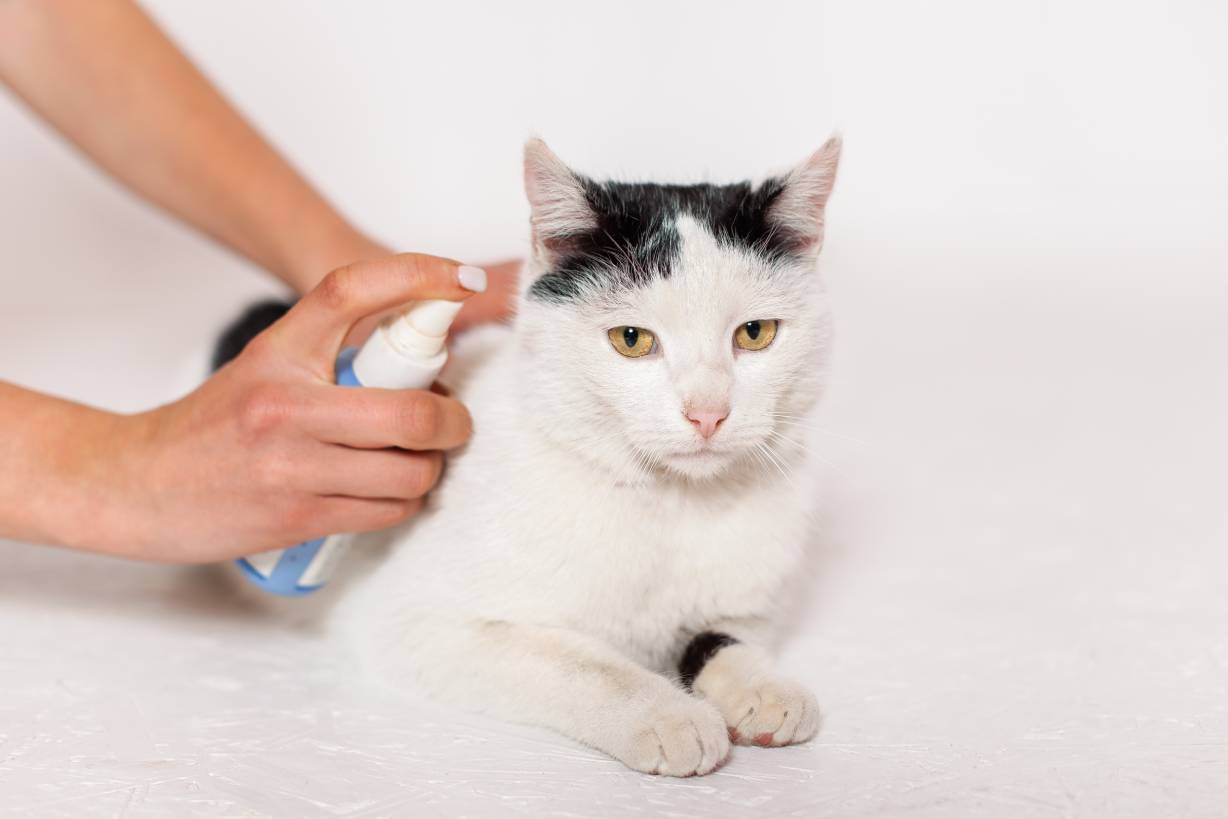VET APPROVED

The information is current and up-to-date in accordance with the latest veterinarian research.
Learn more »Click to Skip Ahead
You love your cat, but you don’t love sharing your home with pesky bugs like mosquitoes, fleas, and ticks. Fortunately, there are plenty of veterinary-approved insect repellents designed specifically for cats. These repellents can help protect your feline from irritating bites—especially from mosquitoes, which can transmit heartworm disease.
The best cat insect repellent should provide all-day protection, be gentle on sensitive skin, and, most importantly, be completely safe for your cat. Read on to learn more about the types of cat insect repellents available, their pros and cons, and how to keep your cat safe.

What Are the Best Insect Repellents for Cats?
There are different repellents, but not all are effective or safe for cats. Before you choose a repellent, you should speak to your vet about your cat’s risks and choose one that will be effective. If you decide to use an insect repellent for your cat, make sure you choose a product with a good track record.
- Spot on: These tend to be the best options for cats. Topical solutions are easily applied to your cat’s skin and work for approximately 4 weeks. For example, Revolution Plus offers protection against fleas, ticks, roundworms, hookworms, and ear mites, but you will need a prescription to get it.
- Flea-and-tick collars: If you have a cat that spends time outside, a flea-and-tick collar may be a good choice. This type of collar is placed around your cat’s neck and releases flea-and-tick-killing chemicals. While not all collars work against ticks, the best ones do. Collars are effective and can last up to 8 months. Seresto Flea & Tick Collar for cats offers protection against both fleas and ticks and starts working within 24 hours. A flea collar’s downside is that it can irritate your cat’s neck and is difficult to remove if your cat gets stuck. Seresto collar doesn’t offer mosquito protection.
- Insect deterrent sprays: Sprays are effective and cheap; you can buy a large can for around $10. However, they are only mildly effective and last only 30 minutes to a few hours. Don’t use DEET products designed for humans, as these can poison your pet. Use animal-specific sprays, like Flys-Off Insect Repellent Spray.
- Flavored tablets: Chewable tablets containing milbemycin oxime offer protection against mosquitoes and internal parasites such as hookworms, roundworms, and whipworms. The downside is that they are not effective against fleas or ticks.
If you have any questions about the safety of any of the products above, we suggest speaking to a vet.
What Doesn’t Work to Repel Insects
Many cat repellents don’t actually work to repel insects. Any product that promises long-lasting protection is probably a scam and a waste of money.
- Citrus-based sprays: Citrus sprays such as orange and lemon are advertised to repel insects. However, these chemicals attract bugs and don’t repel them. Also, keep in mind that citrus is toxic to cats.
- Homemade repellents: While not always, homemade repellents are often ineffective and could put your cat in danger. Be aware that many homemade repellents contain cayenne pepper, which could be harmful to your kitty.
- Essential oils: Essential oils might be a natural and effective way to prevent insects from biting, however, they should never be used on cats due to the high risk of intoxication. Citronella, eucalyptus, and peppermint are among these essential oils. Cats lack the enzymes necessary to properly absorb and process the compounds that are contained in essential oils.
- Catnip: Nepeta cataria is a well-known herb with euphoric and hallucinogenic effects on cats. It has repellent action on insects, however, it should not be used for that purpose on cats since its effectiveness has not been studied enough.
- Deterrent sprays: Sprays may sound like an effective and cheap option, but their effectiveness is very limited and they can be dangerous. Don’t use DEET products designed for humans, as these can poison your pet.
- Scented candles: While they could be a nice decoration, they don’t do a great job of repelling insects.
How to Choose the Best Insect Repellent for Your Cat
Before you choose a repellent, you should first decide what kind you are looking for. Consider the price, your cat’s health, and the safety of the repellent. Other things to keep in mind are:
- Some collars are effective against ticks and fleas but not against other insects.
- Electronic repellents should be used as an add-on, not as a single means of insect repellent.
- Choose a repellent that is vet-approved and designed specifically for use on cats to ensure that it’s safe for cats.
- Do not use DEET products.

Conclusion
Insect repellents can be an effective way to protect your cat from fleas, ticks, and other pests. With various options available, from spot-on treatments to collars and chewable tablets, you can choose one that best suits your cat’s needs. However, safety should always come first. Before selecting a repellent, consider your cat’s health and lifestyle, and consult your veterinarian to ensure you’re choosing a safe and effective option.
See also:
- Will Cats Keep Bugs Away? The Surprising Answer!
- How to Identify & Treat Bug Bites on Your Cat (8 Tips & Tricks)
Featured Image Credit: Vaillery, Shutterstock












